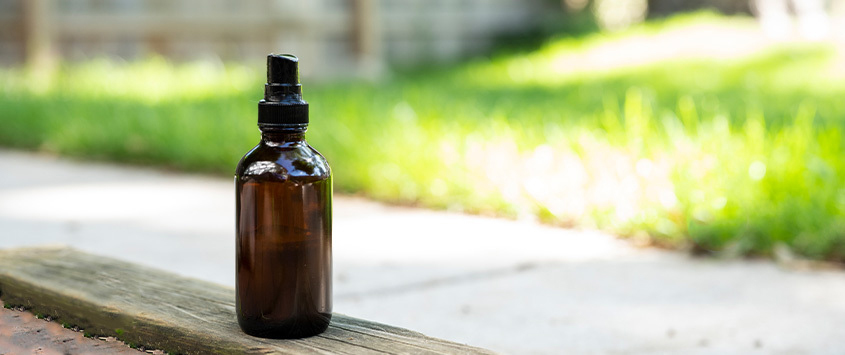How to Make Mosquito Repellent
Tired of swatting away blood-hungry mosquitoes whenever you leave your home? These insects are a nuisance all year. And while tons of commercial chemicals are effective on mosquitoes, they’re not necessarily a great choice to use around kids and pets. DEET and other store-bought repellents come with a long list of warnings. Looking for an all-natural solution? Get ready to learn how to make mosquito repellent that you will feel good about using for your entire family.
Natural Ingredients Mosquitoes Hate the Most
Want to deter mosquitoes for good? Look no further than Mother Nature. There are a ton of natural ingredients that mosquitoes just can’t stand. Essential oils are your friend but a mosquito’s worst enemy. Here are the top 10 essential oils to consider:
- Eucalyptus oil
- Lavender oil
- Cinnamon oil
- Thyme oil
- Tea tree oil
- Rosemary oil
- Chamomile oil
- Peppermint oil
- Cedarwood oil
- Citronella oil
You can find these oils at most health stores or even online. Best of all, creating a DIY mosquito repellent is almost too easy. With only a few ingredients, you can whip up the perfect natural repellent for your family in no time.
The Best Homemade Mosquito Repellent Recipes
Now that you know which essential oils mosquitoes hate, it’s time to learn how to make natural mosquito repellent. These homemade mosquito repellent recipes will protect your family and pets from itchy bites. And all you need is a few oils and a carrier liquid.
DIY Coconut Peppermint Repellant
One of the most effective DIY repellents uses only coconut oil and peppermint. While this combination of scents is delightful to humans, it will chase away mosquitoes. Here’s what you need:
- 1/3 cup coconut oil
- 15 drops peppermint essential oil
Simply mix the ingredients in a jar. At room temperature, the substance will be a liquid. But if you store it in the refrigerator, it will solidify. You can apply it with your fingers on a hot day for a refreshing way to keep mosquitoes at bay. Best of all, kids love the way it smells!
Homemade Rosemary Repellent
This effective DIY repellent has three ingredients—rosemary oil, apple cider vinegar, and water. Here are the exact measurements:
- 1/4 cup apple cider vinegar
- 1/4 cup water
- 40 drops of rosemary essential oil
Combine all the ingredients in a spray bottle and give it a good shake. If you don’t like the smell of rosemary, you can also try lavender. Generously spritz yourself before going outside.
Easy Eucalyptus Mosquito Repellent
Mosquitoes detest the strong aroma of eucalyptus, so this easy homemade mosquito repellent is sure to be a winner! All you need is eucalyptus oil, water, and witch hazel. Here’s the fool-proof recipe:
- 1/3 cup witch hazel
- 1/3 cup water
- 40 drops eucalyptus essential oil
Mix all the ingredients and pour into a spray bottle. That’s it! On its own, witch hazel doesn’t really have a scent, so you can also try adding lemongrass, citronella, or tea tree oil if you don’t care for eucalyptus.
Homemade Repellents Aren’t Always Risk-Free
Just because you can easily buy the ingredients to make homemade mosquito repellents doesn’t mean they come without risk. You should always mix essential oils with a carrier liquid, such as coconut oil, olive oil, witch hazel, or vinegar. If you don’t, the essential oils may cause skin irritation.
Some essential oils are also toxic to pets. If you have furry friends, steer clear of peppermint, citrus, tea tree, and ylang-ylang. Always consult with your vet before applying a DIY repellent to your pets.
Most homemade mosquito repellent recipes don’t last very long. You should reapply every one or two hours for the best results.
What If You Still Get a Mosquito Bite?
Even the best DIY repellents aren’t 100-percent effective. Bites may still happen. If you do get bitten, you can naturally treat the spot using things you probably have at home. Ice will help reduce inflammation. You can also mix baking soda and water to create a thick paste. Apply the paste directly to the bite to pull out any toxins and reduce the itch.
Protect Your Yard from Mosquitoes the Natural Way
While a homemade mosquito repellent is a good start, you should also treat your yard to prevent mosquitoes from invading or hatching in the first place. Mosquito Joe offers a natural mosquito treatment to protect your property from mosquitoes, ticks, and fleas! We use our proven barrier system to ensure every inch of your yard repels mosquitoes. Connect with us online or call 1-855-275-2563 to book a natural treatment with us.








